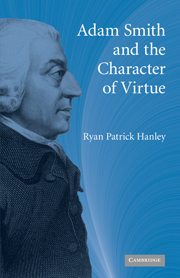Book contents
- Frontmatter
- Contents
- Preface
- Acknowledgments
- Abbreviations
- Introduction
- 1 The Problem: Commerce and Corruption
- 2 The Solution: Moral Philosophy
- 3 Interlude: The What and the How of TMS VI
- 4 Prudence, or Commercial Virtue
- 5 Magnanimity, or Classical Virtue
- 6 Beneficence, or Christian Virtue
- Epilogue: The “Economy of Greatness”
- Index
- References
6 - Beneficence, or Christian Virtue
Published online by Cambridge University Press: 06 November 2009
- Frontmatter
- Contents
- Preface
- Acknowledgments
- Abbreviations
- Introduction
- 1 The Problem: Commerce and Corruption
- 2 The Solution: Moral Philosophy
- 3 Interlude: The What and the How of TMS VI
- 4 Prudence, or Commercial Virtue
- 5 Magnanimity, or Classical Virtue
- 6 Beneficence, or Christian Virtue
- Epilogue: The “Economy of Greatness”
- Index
- References
Summary
BETWEEN CARE AND CARITAS
Smith's remedy for the shortcomings of magnanimity – itself a remedy for the ills of prudence – is to be found in his treatment of beneficence. The specific shortcomings it seeks to address are twofold. First, it aims to ameliorate the potential consequences of the love of nobility and glory that magnanimity encourages. As we have seen, magnanimity encourages transcendence of vulgar self-preference and thereby the pursuit of a greatness and self-sufficiency unavailable to the prudent man. Yet Smith is also keenly aware that self-sufficiency is prone to degenerate into the excessive self-estimation that promotes hubris and injustice. Smith's principal challenge on the heels of this inquiry is thus to set forth a remedy for the possible inhibition of sympathy and concern for justice encouraged by commerce and exacerbated by magnanimity. Yet this only captures half of the aim of his treatment of beneficence. Smith's study of magnanimity revealed not only a problem in the relationship between the individual and commercial society but also a problem in the excellent person's soul – and in particular, a tension between the conflicting loves of individual superiority and of humanity. Smith's account of beneficence seeks to reconcile these opposed longings and thereby set forth a path to the achievement of both greatness and goodness.
In turning to the virtue of beneficence as the necessary remedy for the problems just described, Smith appeals to a very different ethical tradition than those examined thus far.
- Type
- Chapter
- Information
- Adam Smith and the Character of Virtue , pp. 175 - 208Publisher: Cambridge University PressPrint publication year: 2009



